Organizational Change Renewal Report Analysis: RSEC and EBF
VerifiedAdded on 2023/05/28
|6
|1209
|346
Report
AI Summary
This report analyzes the organizational change renewal process undertaken by Rapid Supply Electronics Components Ltd. (RSEC) following its acquisition of Electronic Bits Fast (EBF). The report examines the application of stage theory and organizational development theory in managing the integration of customer service, logistics, and sales functions. It explores the challenges and strategies employed, including the implementation of new IT systems, the creation of a new customer service facility, and the integration of staff. The analysis highlights the roles of change managers, project teams, and the impact of communication and employee satisfaction. Furthermore, the report discusses the relationship between supply chain management and logistics concepts, as well as the importance of considering stakeholder perspectives and employee values in organizational change initiatives. The report concludes by emphasizing the need for effective communication, employee engagement, and a focus on creating a positive work environment to ensure successful integration and value creation from the merger.
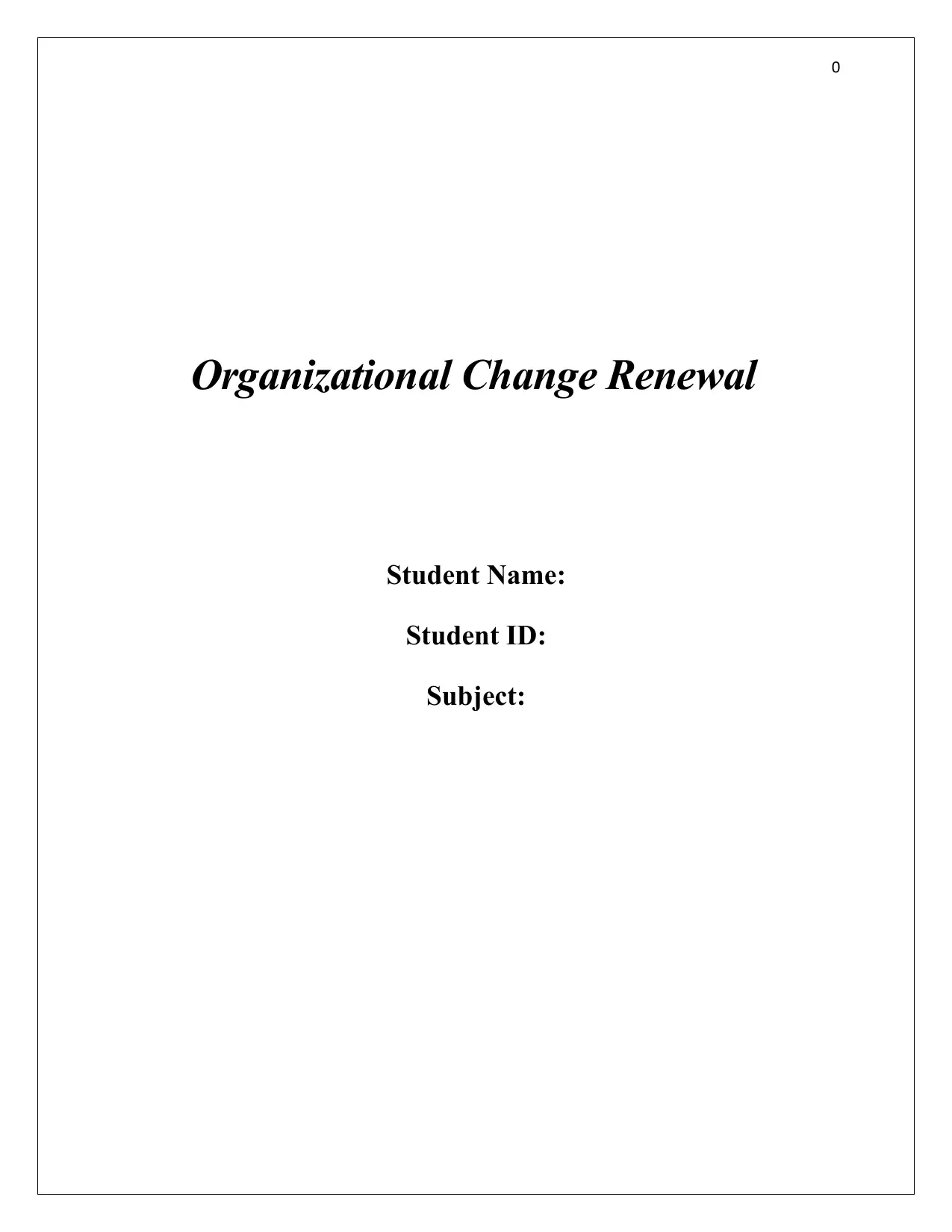
0
Organizational Change Renewal
Student Name:
Student ID:
Subject:
Organizational Change Renewal
Student Name:
Student ID:
Subject:
Paraphrase This Document
Need a fresh take? Get an instant paraphrase of this document with our AI Paraphraser

1
Table of Contents
Answer 1.....................................................................................................................................................2
Answer 2.....................................................................................................................................................3
References...................................................................................................................................................5
Table of Contents
Answer 1.....................................................................................................................................................2
Answer 2.....................................................................................................................................................3
References...................................................................................................................................................5
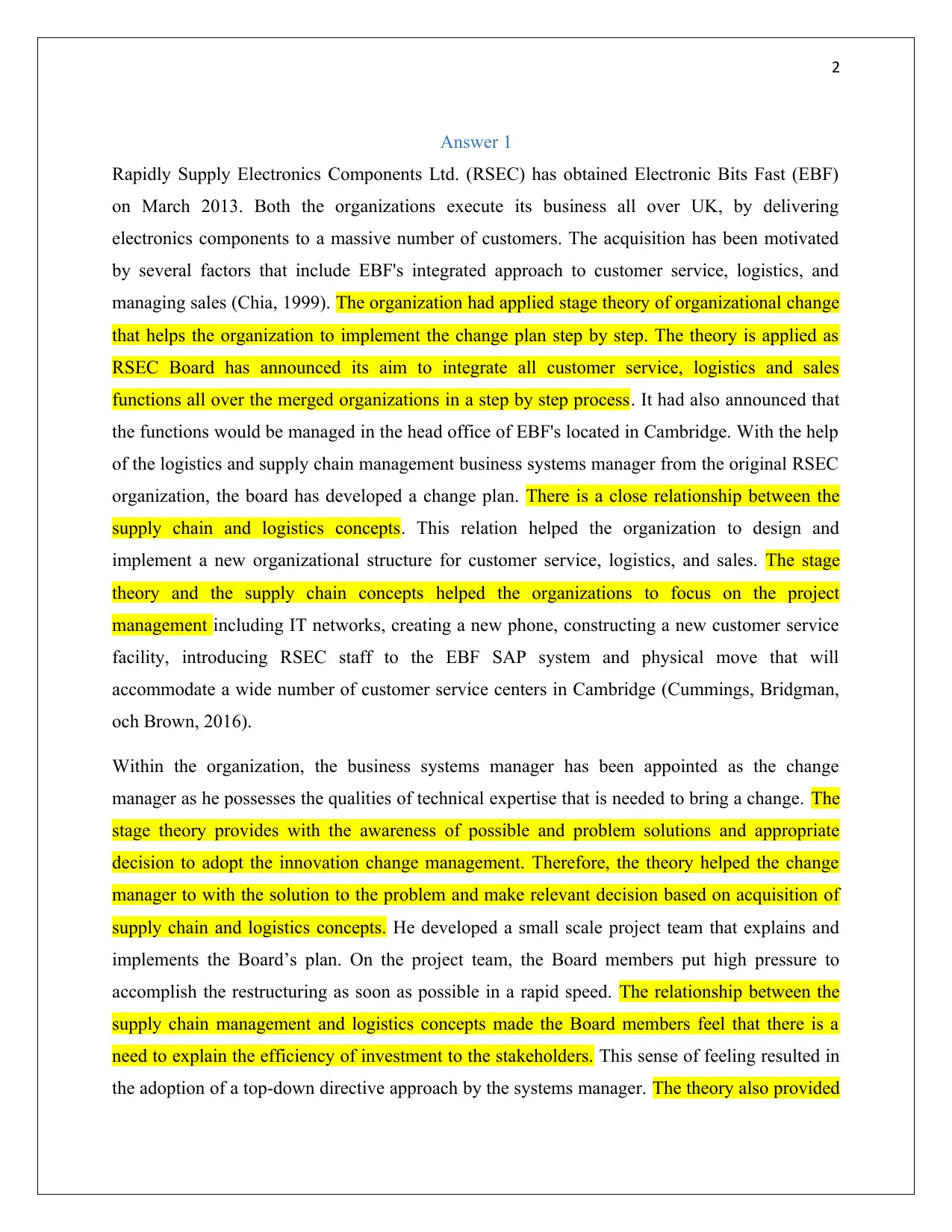
2
Answer 1
Rapidly Supply Electronics Components Ltd. (RSEC) has obtained Electronic Bits Fast (EBF)
on March 2013. Both the organizations execute its business all over UK, by delivering
electronics components to a massive number of customers. The acquisition has been motivated
by several factors that include EBF's integrated approach to customer service, logistics, and
managing sales (Chia, 1999). The organization had applied stage theory of organizational change
that helps the organization to implement the change plan step by step. The theory is applied as
RSEC Board has announced its aim to integrate all customer service, logistics and sales
functions all over the merged organizations in a step by step process. It had also announced that
the functions would be managed in the head office of EBF's located in Cambridge. With the help
of the logistics and supply chain management business systems manager from the original RSEC
organization, the board has developed a change plan. There is a close relationship between the
supply chain and logistics concepts. This relation helped the organization to design and
implement a new organizational structure for customer service, logistics, and sales. The stage
theory and the supply chain concepts helped the organizations to focus on the project
management including IT networks, creating a new phone, constructing a new customer service
facility, introducing RSEC staff to the EBF SAP system and physical move that will
accommodate a wide number of customer service centers in Cambridge (Cummings, Bridgman,
och Brown, 2016).
Within the organization, the business systems manager has been appointed as the change
manager as he possesses the qualities of technical expertise that is needed to bring a change. The
stage theory provides with the awareness of possible and problem solutions and appropriate
decision to adopt the innovation change management. Therefore, the theory helped the change
manager to with the solution to the problem and make relevant decision based on acquisition of
supply chain and logistics concepts. He developed a small scale project team that explains and
implements the Board’s plan. On the project team, the Board members put high pressure to
accomplish the restructuring as soon as possible in a rapid speed. The relationship between the
supply chain management and logistics concepts made the Board members feel that there is a
need to explain the efficiency of investment to the stakeholders. This sense of feeling resulted in
the adoption of a top-down directive approach by the systems manager. The theory also provided
Answer 1
Rapidly Supply Electronics Components Ltd. (RSEC) has obtained Electronic Bits Fast (EBF)
on March 2013. Both the organizations execute its business all over UK, by delivering
electronics components to a massive number of customers. The acquisition has been motivated
by several factors that include EBF's integrated approach to customer service, logistics, and
managing sales (Chia, 1999). The organization had applied stage theory of organizational change
that helps the organization to implement the change plan step by step. The theory is applied as
RSEC Board has announced its aim to integrate all customer service, logistics and sales
functions all over the merged organizations in a step by step process. It had also announced that
the functions would be managed in the head office of EBF's located in Cambridge. With the help
of the logistics and supply chain management business systems manager from the original RSEC
organization, the board has developed a change plan. There is a close relationship between the
supply chain and logistics concepts. This relation helped the organization to design and
implement a new organizational structure for customer service, logistics, and sales. The stage
theory and the supply chain concepts helped the organizations to focus on the project
management including IT networks, creating a new phone, constructing a new customer service
facility, introducing RSEC staff to the EBF SAP system and physical move that will
accommodate a wide number of customer service centers in Cambridge (Cummings, Bridgman,
och Brown, 2016).
Within the organization, the business systems manager has been appointed as the change
manager as he possesses the qualities of technical expertise that is needed to bring a change. The
stage theory provides with the awareness of possible and problem solutions and appropriate
decision to adopt the innovation change management. Therefore, the theory helped the change
manager to with the solution to the problem and make relevant decision based on acquisition of
supply chain and logistics concepts. He developed a small scale project team that explains and
implements the Board’s plan. On the project team, the Board members put high pressure to
accomplish the restructuring as soon as possible in a rapid speed. The relationship between the
supply chain management and logistics concepts made the Board members feel that there is a
need to explain the efficiency of investment to the stakeholders. This sense of feeling resulted in
the adoption of a top-down directive approach by the systems manager. The theory also provided
⊘ This is a preview!⊘
Do you want full access?
Subscribe today to unlock all pages.

Trusted by 1+ million students worldwide
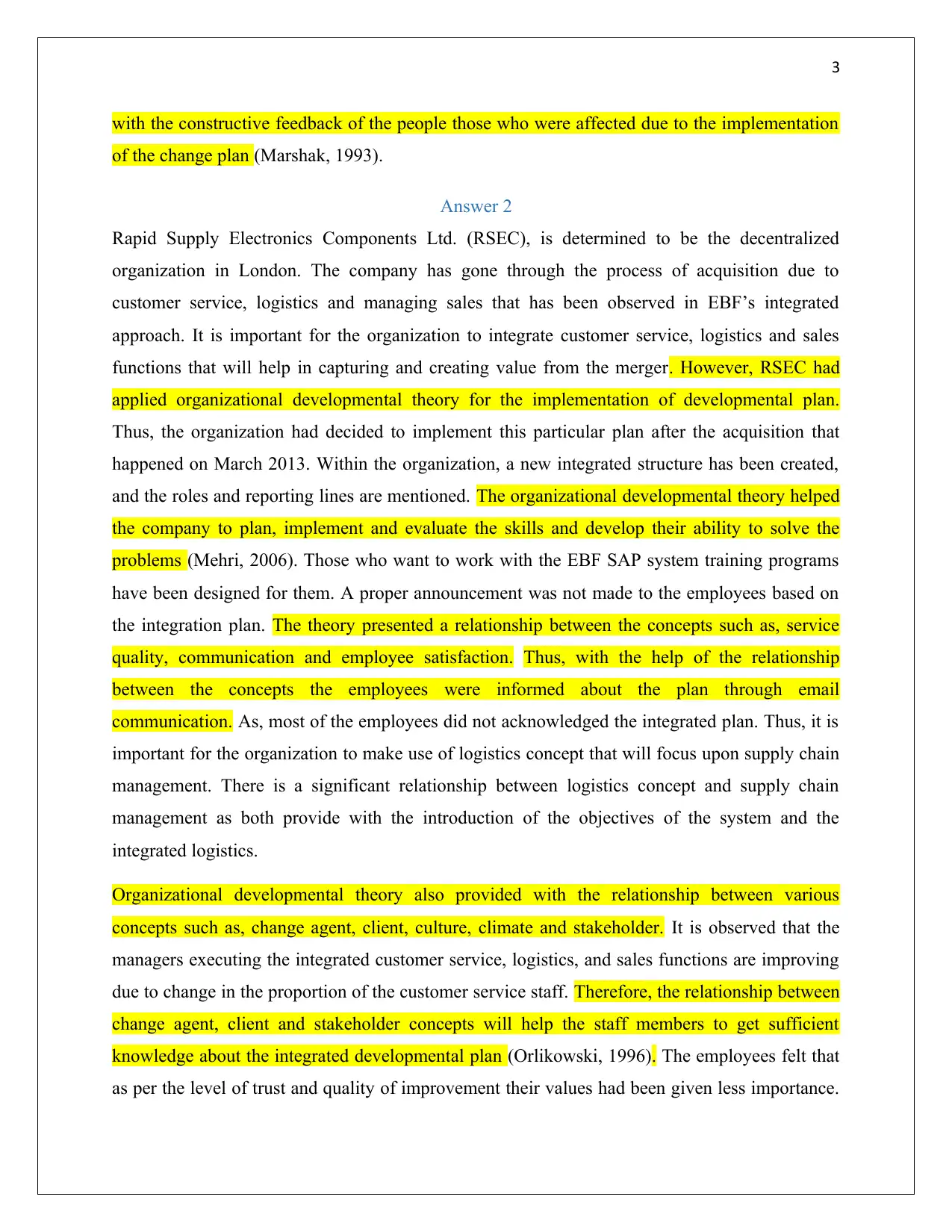
3
with the constructive feedback of the people those who were affected due to the implementation
of the change plan (Marshak, 1993).
Answer 2
Rapid Supply Electronics Components Ltd. (RSEC), is determined to be the decentralized
organization in London. The company has gone through the process of acquisition due to
customer service, logistics and managing sales that has been observed in EBF’s integrated
approach. It is important for the organization to integrate customer service, logistics and sales
functions that will help in capturing and creating value from the merger. However, RSEC had
applied organizational developmental theory for the implementation of developmental plan.
Thus, the organization had decided to implement this particular plan after the acquisition that
happened on March 2013. Within the organization, a new integrated structure has been created,
and the roles and reporting lines are mentioned. The organizational developmental theory helped
the company to plan, implement and evaluate the skills and develop their ability to solve the
problems (Mehri, 2006). Those who want to work with the EBF SAP system training programs
have been designed for them. A proper announcement was not made to the employees based on
the integration plan. The theory presented a relationship between the concepts such as, service
quality, communication and employee satisfaction. Thus, with the help of the relationship
between the concepts the employees were informed about the plan through email
communication. As, most of the employees did not acknowledged the integrated plan. Thus, it is
important for the organization to make use of logistics concept that will focus upon supply chain
management. There is a significant relationship between logistics concept and supply chain
management as both provide with the introduction of the objectives of the system and the
integrated logistics.
Organizational developmental theory also provided with the relationship between various
concepts such as, change agent, client, culture, climate and stakeholder. It is observed that the
managers executing the integrated customer service, logistics, and sales functions are improving
due to change in the proportion of the customer service staff. Therefore, the relationship between
change agent, client and stakeholder concepts will help the staff members to get sufficient
knowledge about the integrated developmental plan (Orlikowski, 1996). The employees felt that
as per the level of trust and quality of improvement their values had been given less importance.
with the constructive feedback of the people those who were affected due to the implementation
of the change plan (Marshak, 1993).
Answer 2
Rapid Supply Electronics Components Ltd. (RSEC), is determined to be the decentralized
organization in London. The company has gone through the process of acquisition due to
customer service, logistics and managing sales that has been observed in EBF’s integrated
approach. It is important for the organization to integrate customer service, logistics and sales
functions that will help in capturing and creating value from the merger. However, RSEC had
applied organizational developmental theory for the implementation of developmental plan.
Thus, the organization had decided to implement this particular plan after the acquisition that
happened on March 2013. Within the organization, a new integrated structure has been created,
and the roles and reporting lines are mentioned. The organizational developmental theory helped
the company to plan, implement and evaluate the skills and develop their ability to solve the
problems (Mehri, 2006). Those who want to work with the EBF SAP system training programs
have been designed for them. A proper announcement was not made to the employees based on
the integration plan. The theory presented a relationship between the concepts such as, service
quality, communication and employee satisfaction. Thus, with the help of the relationship
between the concepts the employees were informed about the plan through email
communication. As, most of the employees did not acknowledged the integrated plan. Thus, it is
important for the organization to make use of logistics concept that will focus upon supply chain
management. There is a significant relationship between logistics concept and supply chain
management as both provide with the introduction of the objectives of the system and the
integrated logistics.
Organizational developmental theory also provided with the relationship between various
concepts such as, change agent, client, culture, climate and stakeholder. It is observed that the
managers executing the integrated customer service, logistics, and sales functions are improving
due to change in the proportion of the customer service staff. Therefore, the relationship between
change agent, client and stakeholder concepts will help the staff members to get sufficient
knowledge about the integrated developmental plan (Orlikowski, 1996). The employees felt that
as per the level of trust and quality of improvement their values had been given less importance.
Paraphrase This Document
Need a fresh take? Get an instant paraphrase of this document with our AI Paraphraser
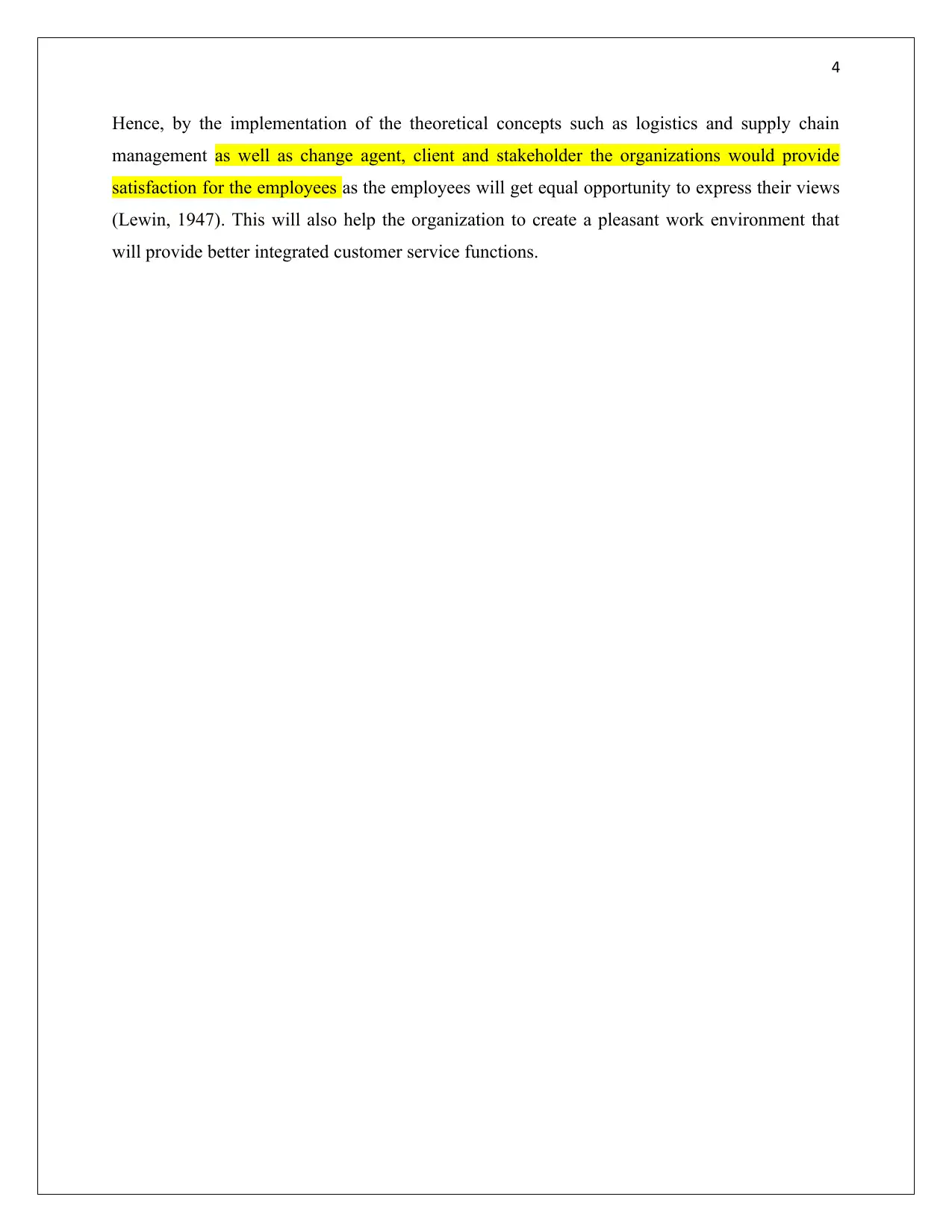
4
Hence, by the implementation of the theoretical concepts such as logistics and supply chain
management as well as change agent, client and stakeholder the organizations would provide
satisfaction for the employees as the employees will get equal opportunity to express their views
(Lewin, 1947). This will also help the organization to create a pleasant work environment that
will provide better integrated customer service functions.
Hence, by the implementation of the theoretical concepts such as logistics and supply chain
management as well as change agent, client and stakeholder the organizations would provide
satisfaction for the employees as the employees will get equal opportunity to express their views
(Lewin, 1947). This will also help the organization to create a pleasant work environment that
will provide better integrated customer service functions.
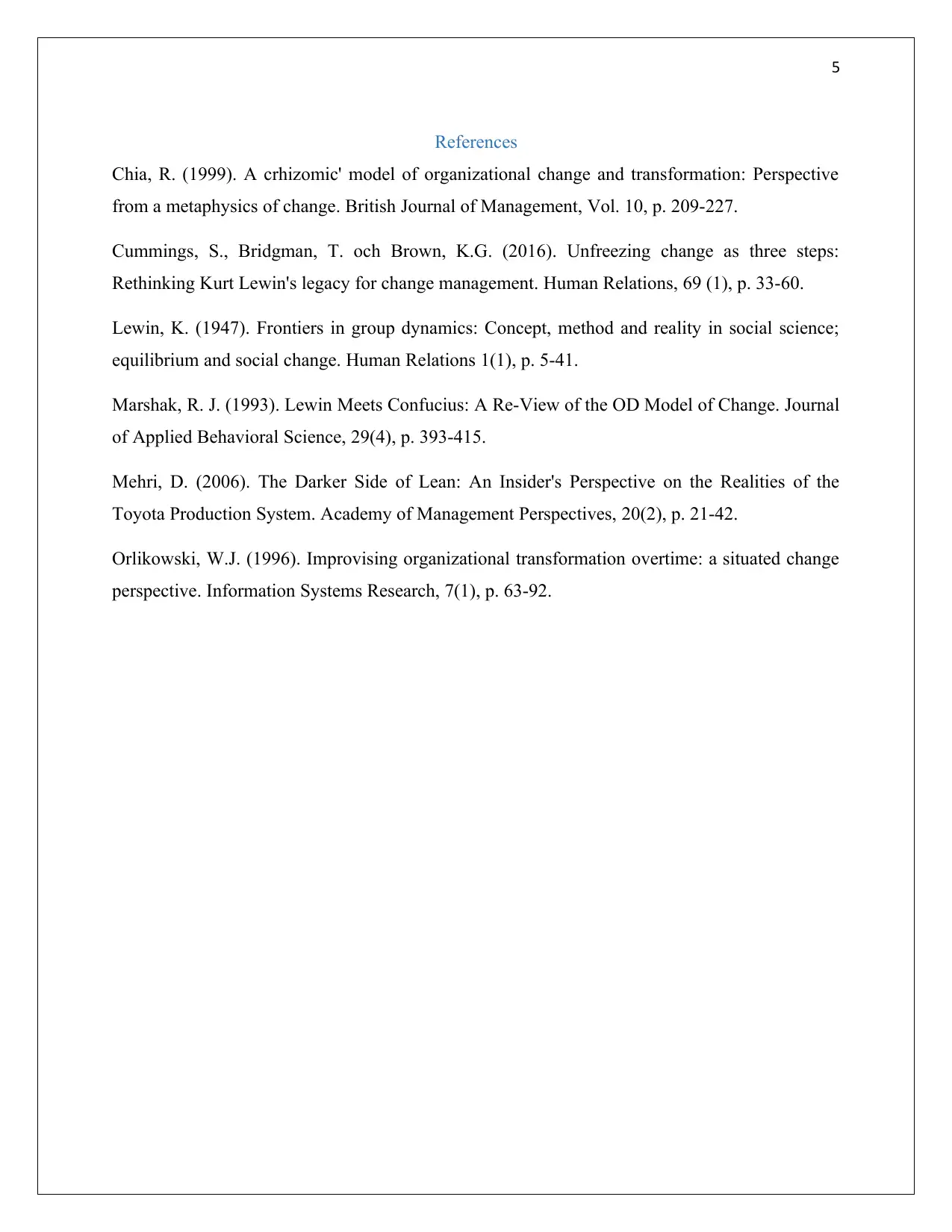
5
References
Chia, R. (1999). A crhizomic' model of organizational change and transformation: Perspective
from a metaphysics of change. British Journal of Management, Vol. 10, p. 209-227.
Cummings, S., Bridgman, T. och Brown, K.G. (2016). Unfreezing change as three steps:
Rethinking Kurt Lewin's legacy for change management. Human Relations, 69 (1), p. 33-60.
Lewin, K. (1947). Frontiers in group dynamics: Concept, method and reality in social science;
equilibrium and social change. Human Relations 1(1), p. 5-41.
Marshak, R. J. (1993). Lewin Meets Confucius: A Re-View of the OD Model of Change. Journal
of Applied Behavioral Science, 29(4), p. 393-415.
Mehri, D. (2006). The Darker Side of Lean: An Insider's Perspective on the Realities of the
Toyota Production System. Academy of Management Perspectives, 20(2), p. 21-42.
Orlikowski, W.J. (1996). Improvising organizational transformation overtime: a situated change
perspective. Information Systems Research, 7(1), p. 63-92.
References
Chia, R. (1999). A crhizomic' model of organizational change and transformation: Perspective
from a metaphysics of change. British Journal of Management, Vol. 10, p. 209-227.
Cummings, S., Bridgman, T. och Brown, K.G. (2016). Unfreezing change as three steps:
Rethinking Kurt Lewin's legacy for change management. Human Relations, 69 (1), p. 33-60.
Lewin, K. (1947). Frontiers in group dynamics: Concept, method and reality in social science;
equilibrium and social change. Human Relations 1(1), p. 5-41.
Marshak, R. J. (1993). Lewin Meets Confucius: A Re-View of the OD Model of Change. Journal
of Applied Behavioral Science, 29(4), p. 393-415.
Mehri, D. (2006). The Darker Side of Lean: An Insider's Perspective on the Realities of the
Toyota Production System. Academy of Management Perspectives, 20(2), p. 21-42.
Orlikowski, W.J. (1996). Improvising organizational transformation overtime: a situated change
perspective. Information Systems Research, 7(1), p. 63-92.
⊘ This is a preview!⊘
Do you want full access?
Subscribe today to unlock all pages.

Trusted by 1+ million students worldwide
1 out of 6
Related Documents
Your All-in-One AI-Powered Toolkit for Academic Success.
+13062052269
info@desklib.com
Available 24*7 on WhatsApp / Email
![[object Object]](/_next/static/media/star-bottom.7253800d.svg)
Unlock your academic potential
Copyright © 2020–2026 A2Z Services. All Rights Reserved. Developed and managed by ZUCOL.





